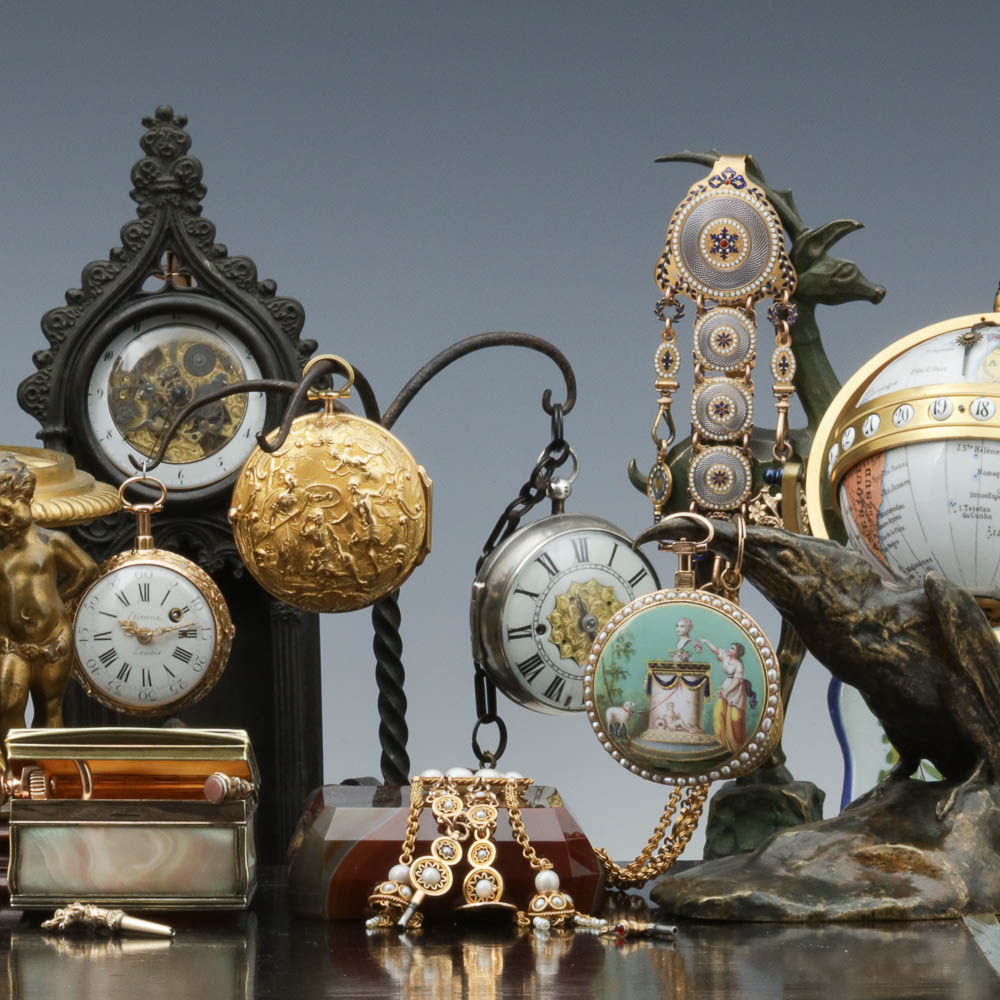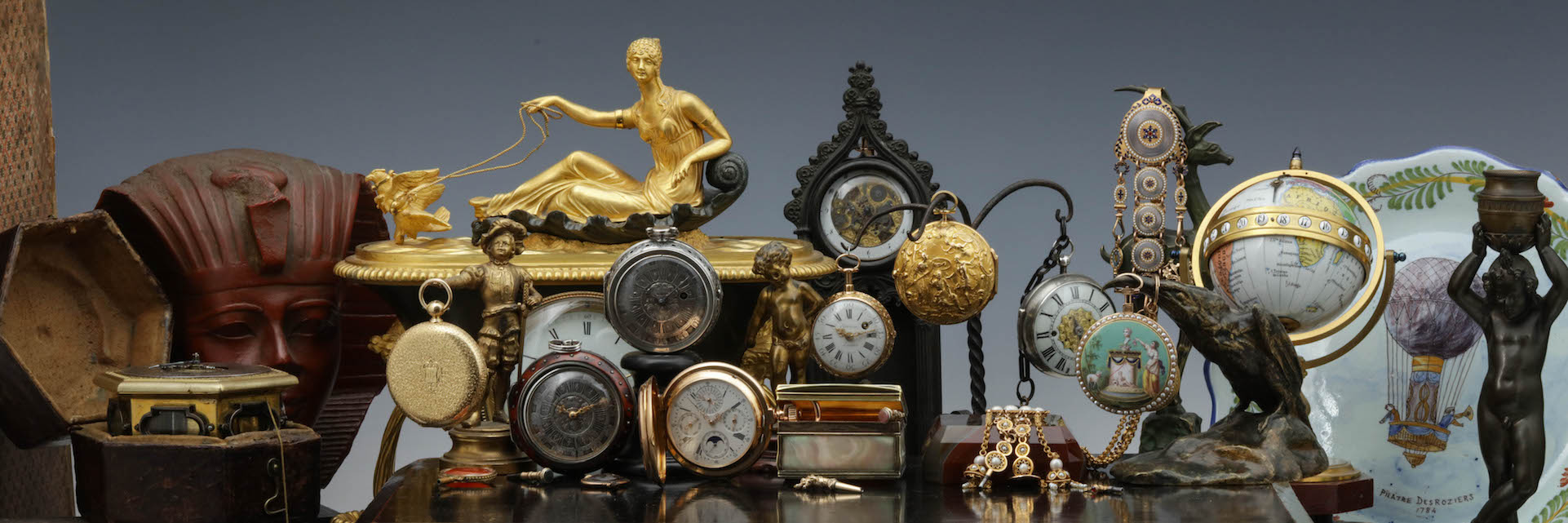.jpg)
.jpg)
.jpg)
.jpg)
.jpg)
.jpg)
.jpg)
.jpg)
.jpg)
.jpg)
.jpg)
.jpg)
.jpg)
.jpg)
.jpg)
.jpg)
.jpg)
.jpg)
.jpg)
.jpg)
Excellent Empire mantel clock, the young Bacchus drinking wine, France around 1810.
Flawless Empire pendulum depicting Bacchus sitting on a wine barrel drinking wine.
France, probably Paris, circa 1810. Ormolu, finely chased, matted and brightly polished; the base is burnished. The original mercury gilding is exceptionally well preserved and of the best quality.
White enamel dial with black Roman numerals, original gilt empire hands. The dial and hands are perfectly preserved.
Two-tiered bronze case with very rare depiction of "Young Bacchus drinking wine". The god of wine sits on a barrel covered with a lion skin and raises his glass.
On the side a wine gourd filled with grapes and on the right a tall full wine jug. The pedestal frieze shows in the center the symbolic animals belonging to Bacchus - two tigers, here feasting on a vine. The sides show wreaths of grapes and flowers, as well as a horn and flute, referring to the wine god's exuberant celebrations. This clock is in every way a celebration of joy, pleasure, wine. Last but not least, the excellent quality is a delight to the eye and a wonderful example of the high craftsmanship of the time. The construction of the pendulum follows the classicist formal ideal of Napoléon's era, the Empire style.
Round fire gilded pendulum movement with thread suspension, lock disc striking movement on the bell each half and full hour. The clean movement is in full working condition, has been cleaned and checked for function by the clockmaker. The case has also been disassembled into its component parts and professionally cleaned.
Size Height. 40 cm/16In, W. 31 cm/12,4In, D. 11 cm/4,4In. Weight 8 kg.
Bacchus, among the Greeks Dionysus, the god of wine, was the son of Jupiter and Semele.
He is usually presented completely unclothed, as a youth of soft, rounded forms, a wreath of vine leaves or ivy in his long curly hair. In his right hand he carries a bunch of grapes, or the Thyrsus, an ivy- or vine-wreathed staff with a pine cone as a knob, in his left a drinking bowl. His team when driving are lions, tigers, panthers or centaurs. Tempted by the jealous Juno, Semele had persuaded Jupiter during her pregnancy to show himself to her in his true form. The mortal could not bear the sight of him and was burned by Jupiter's lightning, but he took up the unripe fruit that had fallen from her womb and sealed it in his own hip, from which, after three months, Bacchus was born for the second time. The Nicaean nymphs in India educated him; later Silenus became his teacher and companion. In the Giants' War he helped the gods to win.
He traveled through almost the entire ancient world to make the preparation of wine and the planting of vines, which he had invented, common, and overcame many peoples in the process. His journey to India is particularly famous. His chariot was constantly swarmed by a jubilant crowd of women and men garlanded with ivy and vine leaves, who wielded thyrsus sticks, sounded flutes, cymbals and timpani, and satyrs and fauns joined them. When the Thracian king Lykurgus defied his orders and wanted to cut down the planted vines with the sickle, Bacchus struck him with madness, so that he cut off his own foot, which he thought was a vine. The king Pentheus of Thebes, who was hostile to him, and the three daughters of Minyas, who did not want to celebrate the feast of Bacchus, also met his revenge. The latter he turned into bats. King Midas, on the other hand, who returned the lost Silen to him, and others received rewards from him. When he was waiting on the beach for a ship to cross to Naxos, Tyrrhenian pirates came and wanted to kidnap him as a slave. But suddenly ivy and vines surrounded their boat in the open sea; Bacchus took the form of a lion, tore the master of the ship apart, and turned the crew into dolphins.
Bacchus had several lovers, but only Ariadne, whom he found on Naxos, he raised to his wife and made her immortal, like his mother, whom he led from the underworld to Olympus. Bacchus was usually sacrificed to goats, which were considered his enemies because of the damage they do to the vines. His priests and worshippers were called bacchants and bacchantes, and the festivals dedicated to him were called bacchanalia, orgies and dionysia. At first they consisted mainly of imitating his triumphal processions; later, however, they degenerated into the most luxuriant and coarse licentiousness and were therefore forbidden by the Senate in the Roman Empire in 187 BC. Bacchus was also called the good god and at the end of every banquet it was said: one more cup to the glory of the good god.
Source: Brockhaus Conversations-Lexikon, Volume 1. Leipzig 1837.
| brand: | Unbekannt/Unknown |
| material: | Bronze, feuervergoldet, ormulu |
| movement: | Anker Hemmung |
| dial: | emaille / Enamel |
| features: | Halbstundenschlag |
| age: | ca. 1810 |
| condition: | excellent Condition |
| country: | Frankreich / France |
The love for old things has kept me working as an antique dealer for over twenty-five years. Originally born in Denmark, I have been living in Berlin for a long time. Curiosity and the desire to expand my specialist knowledge lead to a lively exchange with collectors. Not least through these contacts I constantly buy estates and collections and get beautiful old things again and again. Always on the search for small and large treasures, the quality and the high craftsmanship of the individual pieces mean a lot to me. For over 18 years I have been concentrating on trading on ebay. A fast, customer-friendly and uncomplicated process is particularly important to me.
I wish you a lot of fun while browsing, should you have any questions, do not hesitate to contact me
carsten berger
PS. This eBay-shop is a new project of mine, I sell on ebay since 18 years with my first eBay name carsten-antik on eBay.de, feel free to „pas by“ to read my 100% positive Feedback score (5019*).

